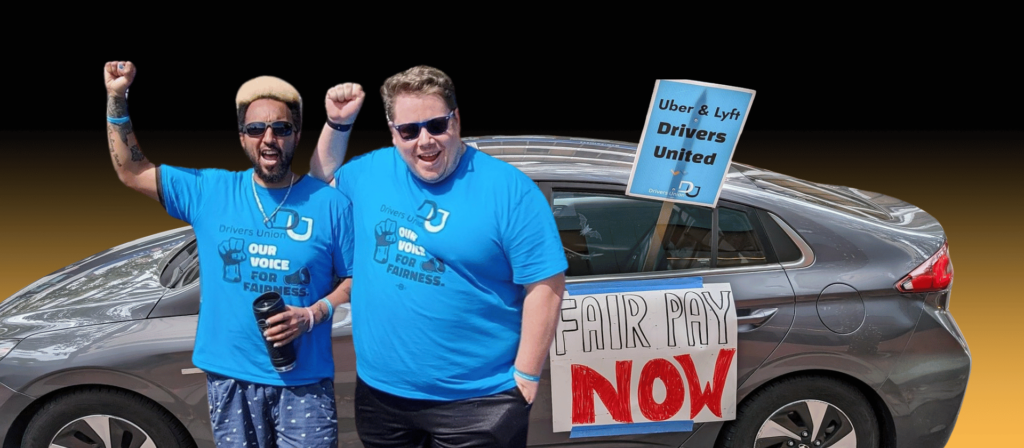Rideshare drivers have had enough. Confronting low pay and tough working conditions, , drivers for Uber and Lyft are organizing and fighting to change public policy. In this episode of Policy for the People, we speak with Nathaniel Hudson-Hartman and Joe Jackson, rideshare drivers and organizers with Drivers Union OR, about the realities of the industry and how drivers are fighting back.
Listen to prior episodes of the show
Juan Carlos Ordóñez, host: Imagine turning on your phone and finding out through an app that you no longer have a job. For some workers, drivers for Uber and Lyft, his is a distinct possibility. Rideshare drivers report having their accounts suddenly deactivated without explanation, putting on hold their way of earning a living. And deactivation is only one of many challenges that rideshare drivers confront in the workplace. But rideshare drivers have begun to organize and push back.
In this episode of Policy for the People, we talk with Nathaniel Hudson-Hartman and Joe Jackson, rideshare drivers and organizers with Drivers Union Oregon. They discuss the essential nature of their work, the low pay and lack of protections that come with the job, and how drivers are coming together to demand better working conditions.
I began by asking them what Drivers Union Oregon is, and how they came to be involved in the organization. And this is how Nathaniel responded.
Nathaniel Hudson-Hartman: You know, Joe and I are long time rideshare drivers. We joke that we have almost 20 years of experience between the two of us. I’ve been driving for eight years. Joe’s been driving for ten. And, you know, we have connected and been part of building this community of rideshare drivers in our state, which is no small feat since. It’s like herding cats. We’re all kind of in our own little bubbles in our cars. So it’s amazing that rideshare drivers have come together to build this community. But just like with any job, any career path, we face challenges out there.
And so we’ve really come together over those challenges. Drivers all over the world have come together to really look at what’s going on. Why are these things happening? What can we do to make this experience better for everyone, not just for Uber and Lyft? And so back in 2014, I believe, drivers in Washington state came together and said, well, something’s not right here. We are driving our cars into the ground. We are 100% responsible for our costs, for our maintenance and all that stuff. And meanwhile, Uber and Lyft are just taking an unfair and disproportionate percentage of what the riders are paying when drivers out there have the lion’s share of the cost and the risk. So what can we do about it? And so drivers came together.
Drivers Union Oregon, we are an independent, up and coming, very strong and very galvanized collection. I like to call this a merry band of rideshare drivers, uniting, moving together and fighting for beneficial changes for more sustainable, more equitable rideshare experience for Oregonians.
Juan Carlos: I definitely want to explore the challenges that rideshare drivers are experiencing. Before we get to that, though, I wanted to know a little bit about your experience and how you came to be a rideshare driver. And, Joe, I wonder if you can begin by sharing a little bit about your story.
Joe Jackson: I became a rideshare driver in June of 2015, and you know, my reasoning for it was I actually lost a very close friend. Unfortunately, a DUI situation. Somebody had struck the side of the truck that she was riding in, and she died on the scene. So I started driving because I said, hey, you know, if the option is always there for somebody to get home, then there is no reason that a death like this should happen.
And really, that sort of ignited my passion towards getting people home safely and pushing to always make sure that somebody is available to get people home. And I’ve expanded on that. As rideshare drivers, we’re a designated driver. We’re an ambulance. We’re therapists. We do everything for our passengers. So, we are essential and we love doing what we do.
Juan Carlos: Nathaniel, do you want to share a little bit?
Nathaniel: So I have been almost a lifer in the service industry. I love people. I love being of service to people. So I’m a western New York native. I moved to Oregon in 2017, and I quickly realized that the cost of living here was much higher than it was in my little city back home.
And so when I moved to Oregon, you know, I thought, well, what can I do? Because I need to supplement my income. And we didn’t have Uber or Lyft back home at the time, but I kept hearing all the radio advertisements and I was like, yeah, this could be fun. Learn the city, make some money. And I got in and I was hooked. From the first to the time I got my car registered, started taking rides, I was hooked.
I didn’t realize what it was until I gave a ride to someone who was just assaulted, and I was their safe ride home. They were in the back seat. They started crying, and I asked them what happened. They had just been assaulted, and they just needed somebody to talk to, and they needed a safe ride home. And that was kind of the moment where it became very clear to me that we weren’t just giving people rides home from the bar after a night of drinking, which, by the way, is an essential service in and of itself, as Joel mentioned, keeping drunk drivers off of the road. But, you know, bringing people to doctor’s appointments, victims of domestic violence, unsheltered folks. You know, that was like my badge of honor. And from that moment forward, I just I knew that this was just kind of part of God’s plan for me to be of service to the community.
No matter what people say, driving, rideshare driving is not an easy job. It is something that a lot of folks can do, but there’s a lot of challenges. There’s a lot of dangers and a lot of risks. It’s one of the most dangerous professions there is. Drivers just lack of protections out there.
Juan Carlos: Let’s talk about those challenges that come with the job. What are the main challenges that rideshare drivers face in common, that are pretty typical? And Joe, do you want to start us off with your perspective?
Joe: Sure. So I think that one of the main challenges of this work versus other work is just the the pay and how it’s changed over the years. When I first started driving for rideshare, not only was I contractually guaranteed 80% of what the passenger was paying, but it was a fairly good living wage at the time. And comparatively, gas prices were a bit lower back then, in the like mid $2 to $3 range versus what it is now.
Pay since then has more than halved. And our portion is less than half of what the passenger pays. So it’s like the cost of the fares have gone up. The cost of living has gone up. The cost of maintenance on your vehicle has gone up as well, as just operating the vehicle. And yet our pay has gone way down.
And so one of the biggest challenges is you start out doing this job that’s really great. And then you very suddenly, without even realizing it, are working more than full time just to make ends meet.
Juan Carlos: How long are the hours then that you have to work in order to pay for the essentials? Do you have a sense?
Joe: Well, given that I live on the third floor apartment, which carries a slight discount, and I have a roommate, I only have to work roughly about 55 to 60 hours a week.
Juan Carlos: How about you, Nathaniel? What experiences have you had with regard to the pay structure?
Nathaniel: I mean, Joe pretty much laid it out. We were guaranteed at least 80% of the fare, which is fair, considering that we are burdened with all of the cost. So the erosion of driver pay is a big one. Couple that with the inflation of rider fares. One of the biggest misconceptions that Uber and Lyft put out there, and I’m sure we’ll get more into this, once we start talking about legislation, is that rider fares will go up if driver pay goes up.
But we have screenshots for days that show that passengers are paying upwards of $90 to $100 per ride, and drivers are earning 13% because of this low pay and the long hours that drivers are working. You know, we’re out there not just driving our cars into the ground, but driving ourselves into the ground.
But one of the most awful and just reprehensible parts of our experience is what we call deactivation. And this just translates into being fired by an app. And so we are representing drivers in droves by the hundreds, as a matter of fact, that wake up one day, they get ready for work, they kiss their loved ones goodbye, they go gas up their car, they wash their car, they get ready, they flip on their app, and there’s this big red exclamation point that says, your account has been put on hold.
And this process oftentimes is done by artificial intelligence, by an algorithm that decides that you no longer deserve your job. And there is oftentimes no clear explanation why. And the chat support that you end up texting with to try to get your job back is done 100% in English. A large percentage of our workforce are immigrants, folks that maybe English is their second, third or fourth language. The barrier to entry is very low for those folks. This is just a frustrating and culturally biased process. And even Joe and I, we were born here. Our English is fairly decent. We’ve both been wrongfully deactivated.
My story has been pretty well documented by now, but the short of it is my father passed away. I was out there earning money to try to pay for my ticket home. I was grief struck and I had to cancel a trip, and I received a complaint and I was deactivated. My account was put on hold. I was told I have one chance to appeal. I can submit documentation. I sent them my father’s death certificate, which was, let’s face it, I didn’t have to do that. But I chose to. But I was found to have generically violated their terms of service. And so we have drivers out there that are being deactivated for false complaints, but also from background checks that are taking too long or app glitches.
Juan Carlos: Joe, what was your experience when you were deactivated? What happened?
Joe: I was deactivated due to a false complaint. I had a passenger who was yelling out my window and things like that. And when I rolled up my window and I turned on the window lock so they couldn’t roll it down and yell at people on the street anymore. They started yelling at me and started telling me that they’re going to call Uber and tell them that I was drunk driving.
Lo and behold, about 20 minutes after this trip, my account was deactivated. Thankfully, I knew the reason why. So I went into the local police station and did a voluntary breathalyzer, took the print out and sent it to them, just preemptively. A lot of drivers don’t have the benefit of being able to do that, because it doesn’t provide you a reason when your account is placed on hold or if you’re deactivated.
I did so preemptively, simply because that’s what the passenger was yelling he was going to do. Threatening to do. I also sent a picture of my Alcoholics Anonymous token, which was at seven years at the time. I’m now coming up on 11 years. It was offensive to me to be accused of drunk driving when I had done so much for myself to never drink again.
Juan Carlos: For the listeners who may not be aware of the full context here, getting deactivated and all of a sudden not being able to earn money through rides, there’s no UI system – unemployment insurance system – for rideshare drivers. There’s little in the way of a safety net in the country. What’s the economic impact on the driver and their families?
Nathaniel: Tremendous. I mean, we have drivers now that have been deactivated that are in danger of losing their homes because, again, we are incentivized to buy these expensive cars. And especially because the pay is so low, you end up kind of getting into this trap of being incentivized to pay to purchase the more expensive car, to make more money. And so you oftentimes end up incurring a car note. And so you get deactivated. There goes your income. There goes your car payment. And so the economic injury and hardship that drivers are facing out there, particularly, as Joe mentioned, as the expenses have gone up tremendously, can be astronomical.
Juan Carlos: You touched on this a little bit earlier, but another issue that’s prominent is access to paid leave. Many workers in Oregon now can access paid leave, but rideshare drivers and a lot of gig workers can’t. Can you say something about why it’s so important? Joe, do you want to go first?
Joe: Yeah, I’ll take this one. My son is coming up on a year old. Actually, in just about a week and a half is his first birthday. And last year, right around this time, with my wife being very pregnant and me living in Salem, working in Portland, I was kind of taking risks in going to work because you never know when she’s going to go into labor. And so I made the decision to actually stay home and be there so that I can take her to the hospital and be there for the birth of my child, so that I can welcome him into the world. But I did so at great risk, without any kind of paid family medical leave. I had no income.
And so when I decided to stay home to welcome my child into the world, I was also welcoming him to the potential risk of homelessness. Thankfully I didn’t. A close friend of mine covered the rent. And it wasn’t until my son was six months old that I was able to pay him back for that loan.
But it was so awful to have to make a decision like that. And I’m so happy that I made the decision that I did because welcoming my son into this world is a once in a lifetime experience. And I almost missed it just to pay the bills.
Juan Carlos: Another issue that I’ve seen the driver’s union Oregon raise is the issue of transparency. Can you talk about what you mean by transparency in this context and why it’s an important factor as well in terms of working conditions?
Nathaniel: I really appreciate you bringing this up because we know it; the TNCs know it. TNC stands for Transportation Network Company. That’s what Uber and Lyft are considered or considered. I don’t know if the passengers always know it, but passengers and drivers are both getting the short end of the stick at the expense of the TNC.
Passengers have oftentimes no idea how much of their fare is going to the driver, and how much is not. But if you follow us on TikTok, we post screenshots, and we have folks from all over the world that are like, What? I didn’t realize the driver wasn’t making most of that. Or, that passenger paid how much? And you know, that goes back to how much Uber and Lyft like to put the fear on lawmakers into thinking that if they vote for a piece of legislation that is going to give drivers a more equitable share of the pay, that the riders aren’t going to be able to afford the service.
So our consumers deserve and demand transparency. And so, you know, the pay transparency thing is big.
Juan Carlos: So you mentioned Senate Bill 1166. This was legislation introduced in the legislative session that ended earlier this year. Can you talk about what this bill would have done, its main provisions and what happened to the bill?
Joe: So this bill would have, first and foremost, established a fair pay standard for drivers. It would have increased their pay from a very low amount in the Portland area, about $0.70 per mile, to a pay that actually matches Washington. For all the drivers watching out there, you’re making more money in Washington state because of successful legislation. So when you’re driving in Vancouver, you’re making $1.34 versus that $0.70 down in Portland. The per minute price would also be going up from its current price.
Beyond the fair pay standard, it was also going to include a sick pay benefit, which would automatically accrue based on the passenger’s time in the back seat of your car. So you spend 30 hours with a passenger and you accrue one hour of sick pay. And it would just automatically accrue and be very easily accessible, easily redeemable for our drivers who oftentimes struggle with understanding programs and other things that might or might not be available. Beyond that, a just cause standard for deactivation cases. So no driver could be deactivated without just cause. And those standards would give arbitrators a tool to use in helping drivers be reactivated in the case of a wrongful deactivation.
Nathaniel: There’s just a couple things I want to add in terms of what SB 1166 was going to do. So we are paid similarly to a taxi driver, only when we have a passenger in the car and there’s a per mile, per minute rate. And so, you know, increasing those per mile and per minute rates is representative of that living wage. And then the last thing that the bill was going to do was also give the riders and drivers that pay transparency. So that way they would be provided a receipt and show exactly how much the driver’s getting, versus how much the companies are taking. So I just wanted to mention that last thing about SB 1166.
Juan Carlos: So what comes next? What does Driver’s Union Oregon have planned in terms of moving forward legislation?
Joe: Well, we’re definitely planning on returning to Salem. We want to come back with something very similar to what we’ve tried. As far as what happened with SB 1166, it has to do with the enforcement of the rules in the bill. The Bureau of Labor Industries is a pretty underfunded organization. So they needed a few employees to handle enforcing our bill, to handle the potential influx of wage complaints, etc.. And with the financial situation in Oregon, they didn’t want to give any money to BOLI for our new program.
Nathaniel: We are trying to instill in our driver community, and really embrace, the idea of controlling the things you can, letting go of the things that you can’t. And obviously state funding is not something that any of us have any clout or any juice or control over whether funds are going to be allocated for a new program. For a new bill like ours, which was Oregon’s first ever, historic rideshare protection package. We had no control over that. But the things that we did and the things that we still do are coming out and making our voices heard. You know, building power and unity and just continuing to lean into our allies like Oregon Center for Public Policy, Unite Oregon, SEIU Local 503, to name a few. A lot of these folks showed up really huge for us in our public hearing that we had, and just continuing to support us and help us. And, you know, mobilizing our workers and making our voices heard. I mean, we had an overflow room for our public hearing. We packed two of those rooms wearing our blue shirts. It was really empowering.
And that’s what our driver community is really embracing, the fact that we have the power to change history. Martin Luther King is one of my greatest inspirations. And he said, change does not roll in on the wheels of inevitability. It comes through continuous struggle. Combine that with one of my other heroes, Frederick Douglass, from my hometown: if there is no struggle, there is no progress.
Juan Carlos: Speaking of the struggle, certainly one of the things that gives me the most hope right now in these difficult times is that we have seen a lot of new energy in the labor movement. I wonder how you see the rideshare drivers and the drivers union fitting within this larger struggle of the labor movement. It seems that if we are going to have an economy that works for everybody, we need to see a robust labor movement.
Nathaniel: Yes, we need a robust labor movement. And at Drivers Union Oregon, we’’re so proud to be a part of that. Joe and I have so many conversations with folks that are in other unions and they’re like, wait, there’s a drivers union? You guys are organizing? Good for you. How can we help? It’s this idea of solidarity. We preach it all the time to our driver community. We have been on the strike lines with IAM local 63, the Boeing machinists, when they were striking, the Oregon Nurses Association at Providence St. Vincent before they got their new contract. And, it’s been amazing to see the support that we’ve been shown as well in our fight.
Juan Carlos: So for the listeners who may want to get in touch with Drivers Union Oregon, or for other drivers who may want to get in touch, what can they do? Where can they go?
Nathaniel: You can find us pretty easily. If you search Drivers Union Oregon, you can find our website, which is driversunionor.org. We are on all major social media platforms. If you’re a driver listening to this, we are fighting for better pay. Come fight with us. If you are interested in joining our coalition or learning more, please contact us. We would love to schedule a meeting with you to discuss that more. The last thing I would say is, a lot of us use the service. I still take rides every now and again when I need them. Please share what you’ve heard here. You know, just talk to your driver. Tell them we have a union, Drivers Union Oregon. Drivers are fighting for better pay, and this is how we do it.





